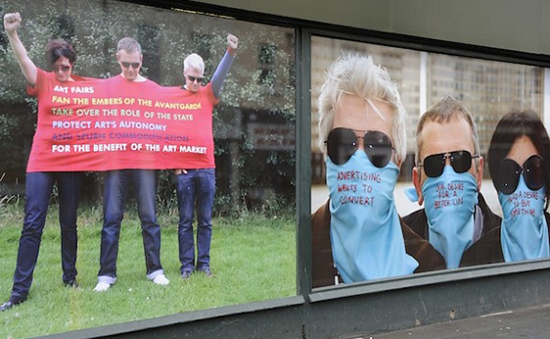Freee Art Collective - The Counter-politics of embodied voice
Dave Beech, Andy Hewitt e Mel Jordan alla Biennale di Liverpool 2010
Slogans ask for things to change. It is a common misconception today that slogans are authoritarian, illiberal and restrictive. Stokely Carmichael would have never used the slogan BLACK IS BEAUTIFUL if he thought it simply stated a fact that we could understand without first changing ourselves and the world.
The feminist slogan THE PERSONAL IS POLITICAL, likewise, would only make sense once feminism had transformed our understanding of each of its keywords. If black is already (universally understood as) beautiful then we do not need the slogan Black is Beautiful and if the personal is already (secured as) political then we do not need the slogan The Personal is Political.
Slogans do not describe the world, they call up a new world to take its place. [Freee Collective]
Dalla Biennale di Liverpool.
Con gli altri artisti selezionati per Re:thinking Trade, una delle sezioni di Touched ospitata all'interno del dismesso Rapid Store in Renshaw Street, il Freee Art Collective, composto da Dave Beech, Andy Hewitt e Mel Jordan, condivide un approccio critico alla commodificazione della sfera pubblica e propone un tentativo di negoziazione o occupazione dei canali di comunicazione solitamente monopolizzati dalle grandi compagnie commerciali.
E se la comunicazione pubblicitaria cui siamo solitamente soggetti è spesso unilaterale e anonima, paradossalmente senza volto, l'interesse di Beech, Hewitt & Jordan è suscitare una risposta, riappropriarsi dei canali ufficiali per minare le dinamiche di potere nella formazione dell'opinione pubblica. Questo arduo impegno è perseguito con slogan, manifesti e pubblicazioni; da un lato, attraverso l'appropriazione di un linguaggio che nasce politico - gli slogan - e che unisce la sintesi del formato a un'articolazione tutt'altro che semplicistica dei contenuti, dall'altro, occupando legalmente gli spazi pubblici e mettendoci la faccia:
there are two economies (of the public sphere). The one handmade of individuals or small-groups who make protest and therefore visualize themselves or speak for themselves with banners and flags and there is the official expensive advertising public sphere. In the past people suggested us that we should only occupy the inexpensive handmade economy that is where our kind of idea belongs to but we have always refused that; we think that all the advertising spaces that are left in the world should be colonized by ordinary people and not monopolized by big companies.
We resist doing things like graffiti that brings protest into something that is illegal and unofficial. What we should do is to nationalized all the advertising spaces and make them available to everybody to share their opinion and have their debate in public. That is why we occupy the official public spaces rather than going down on the streets, hidden, secret, nefarious. We have avoided to stay in the economy where we are supposed to belong to.
We have always argued that if you make art of any kind, that is political, then it has to be twice political, in what you say but also in what you do. That's why in the images you see us appear, it is not the slogan on its own, we have to be part of it, we have to perform the slogan and that's part of our politics of embodied politics.

A Liverpool presentano otto slogan - tra i quali don't let the media have the monopoly on the freedom of speech; advertising wants to convert our desire for a better life into a desire to buy something; advertising for all or for nobody at all; reclaim public opinion - otto stampe viniliche che occupano le vetrine del Rapid Store in quasi tutta la sua lunghezza. Come ci dicono i Freee Collective,
you can say that this is like having an album instead of a single and the single is kind of ok, you can like it or not like it but the album is richer because you start relating one thing to the other. What it is interesting for us is that it makes people look at the work in a different way; instead of just beeing about thinking of what we are trying to say, when you have several different slogans pulling in different directions then I think people have to start looking in a much more complex and much layered and new way rather than thinking that we are saying one thing.
Li abbiamo incontrati e abbiamo parlato di slogan, della loro disseminazione, della differenza che corre tra i loro slogan e gli statements e truisms di altri artisti che lavorano con il linguaggio - Barbara Kruger e Jenny Holzer - abbiamo parlato dei 'manifesti' - a loro attivo The Freee Manifesto For the Alterglobalization of Art, The Freee Manifesto For Guerrilla Advertising, The Freee Art Collective Manifesto For A Counter-Hegemonic Art e The New Futurist Manifesto - e di come la loro complessità organica sia controbilanciata dalla flessibilità dei contenuti spesso trasformati in slogan efficaci. Abbiamo parlato di opinione e sfera pubblica, di coinvolgimento e della bellezza dell'impegno.
La musica che l'accompagna è tratta da un EP degli Hell on Wheels, scaricabile da Kirstenpostcard; si tratta di due cover, una di The logical song dei Supertrump e una di Holiday song dei Pixies.
